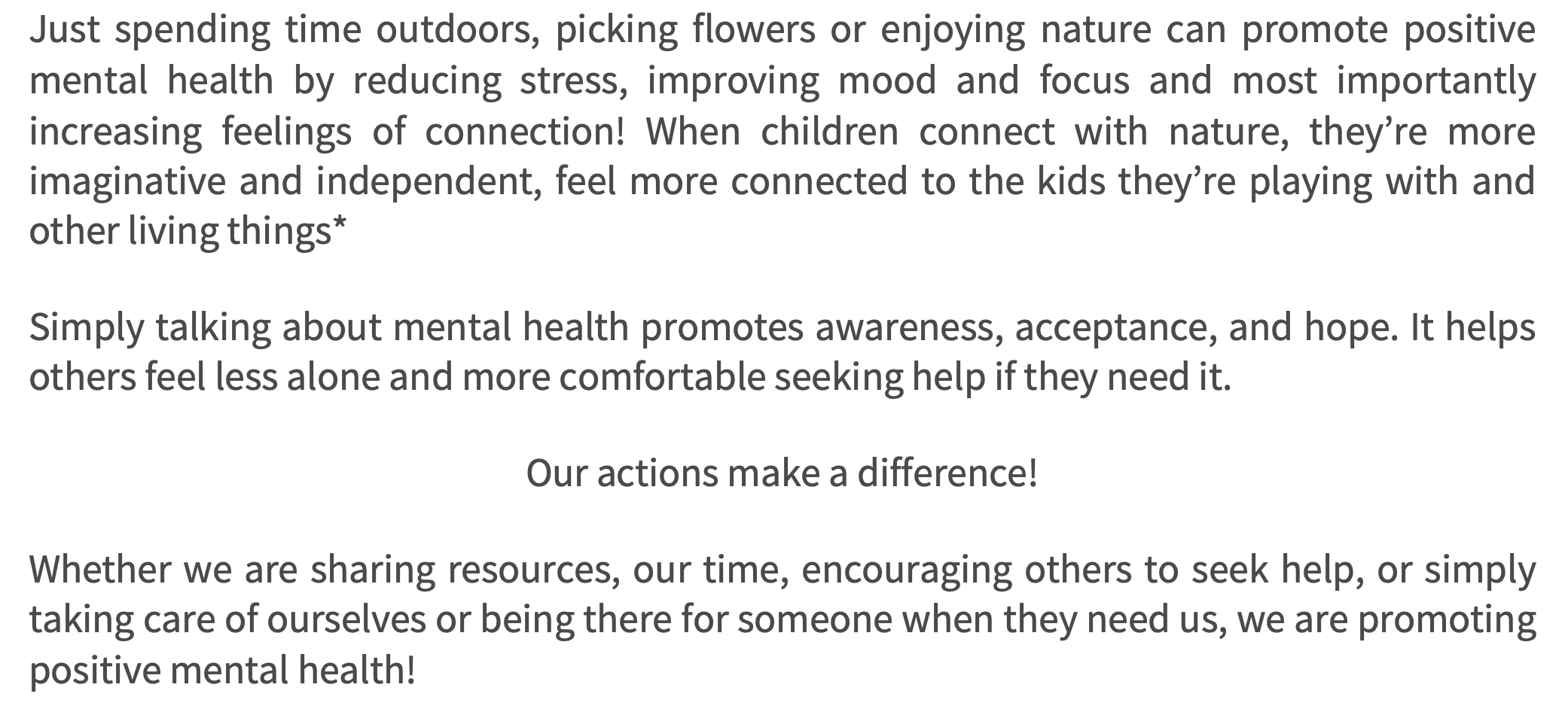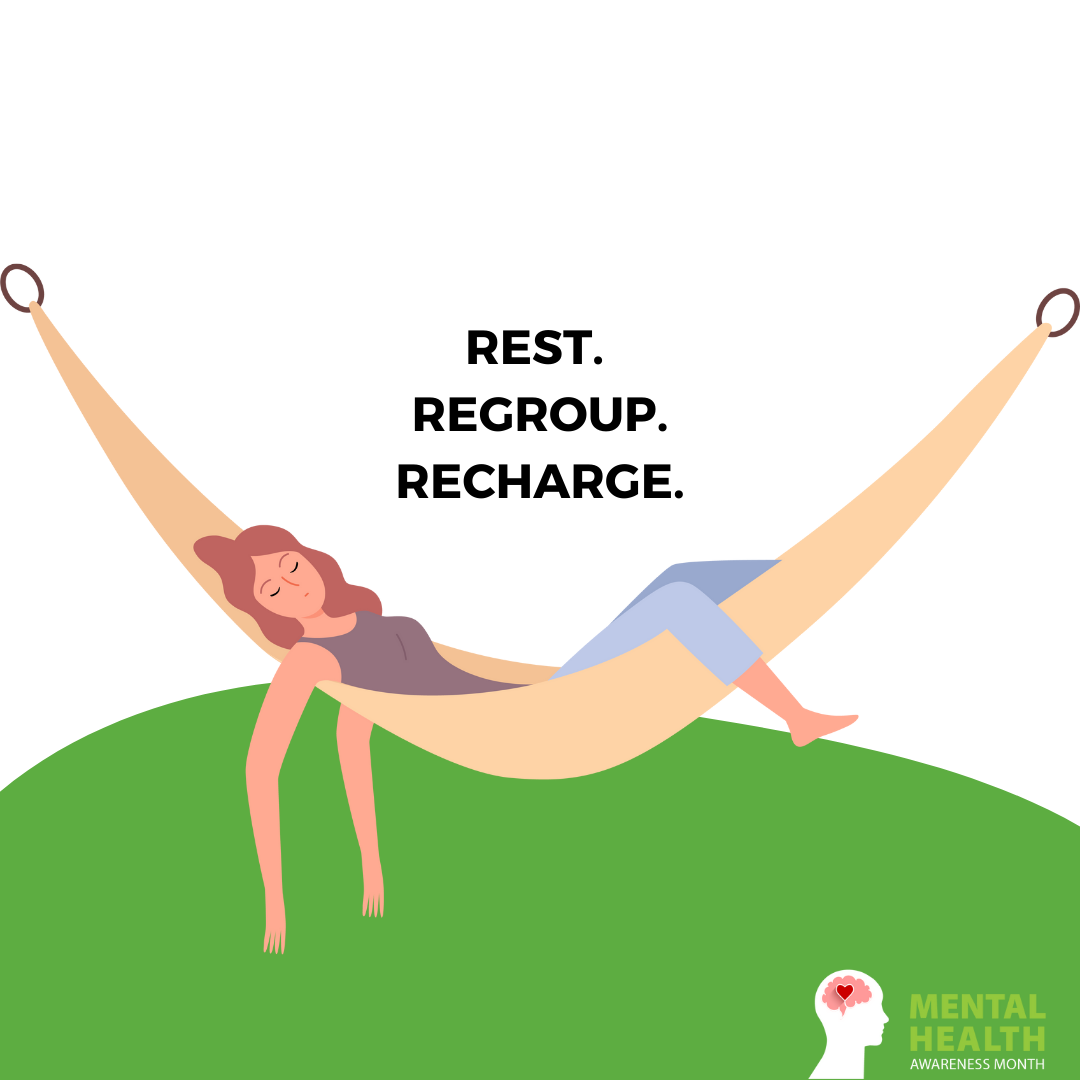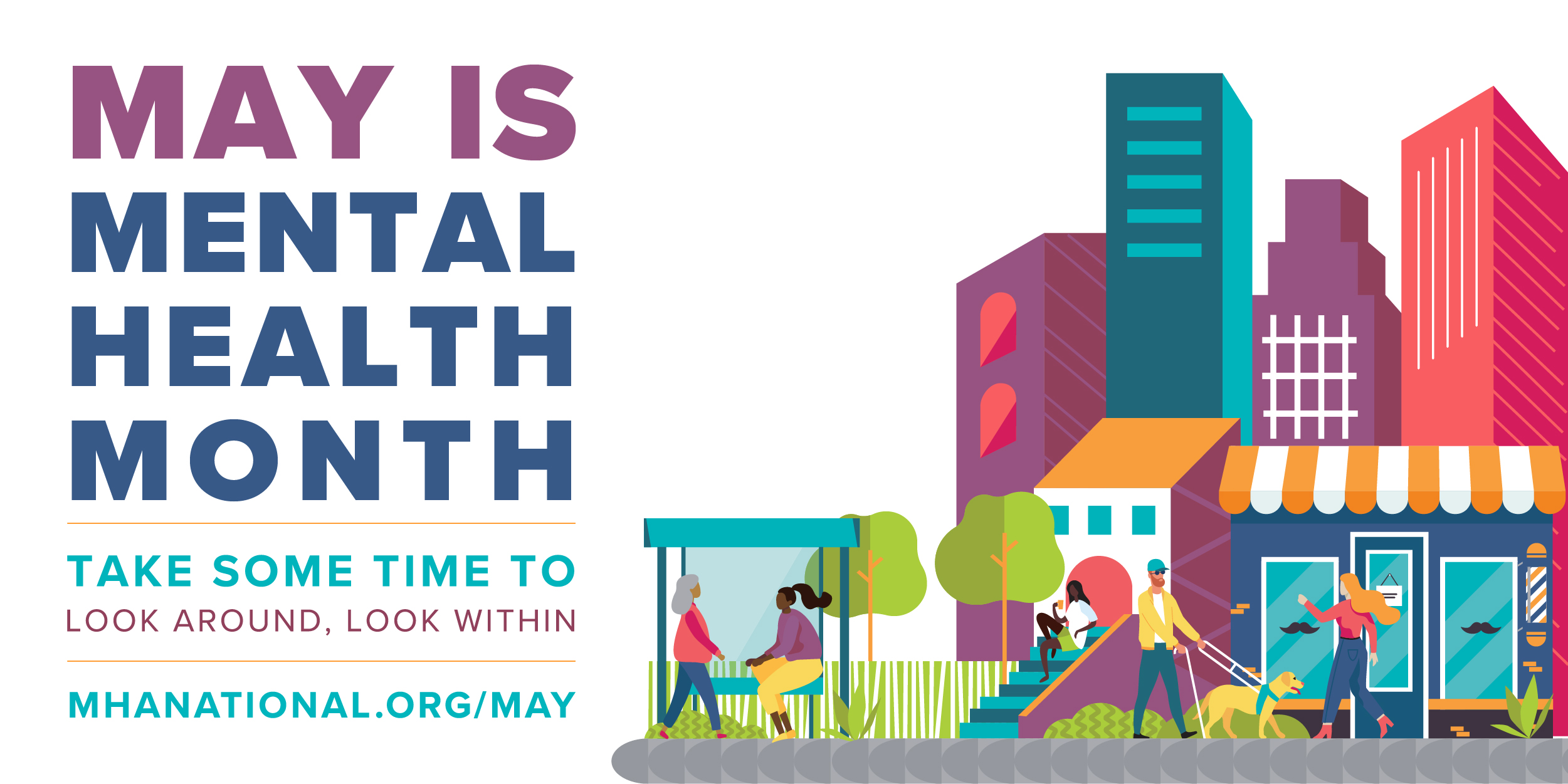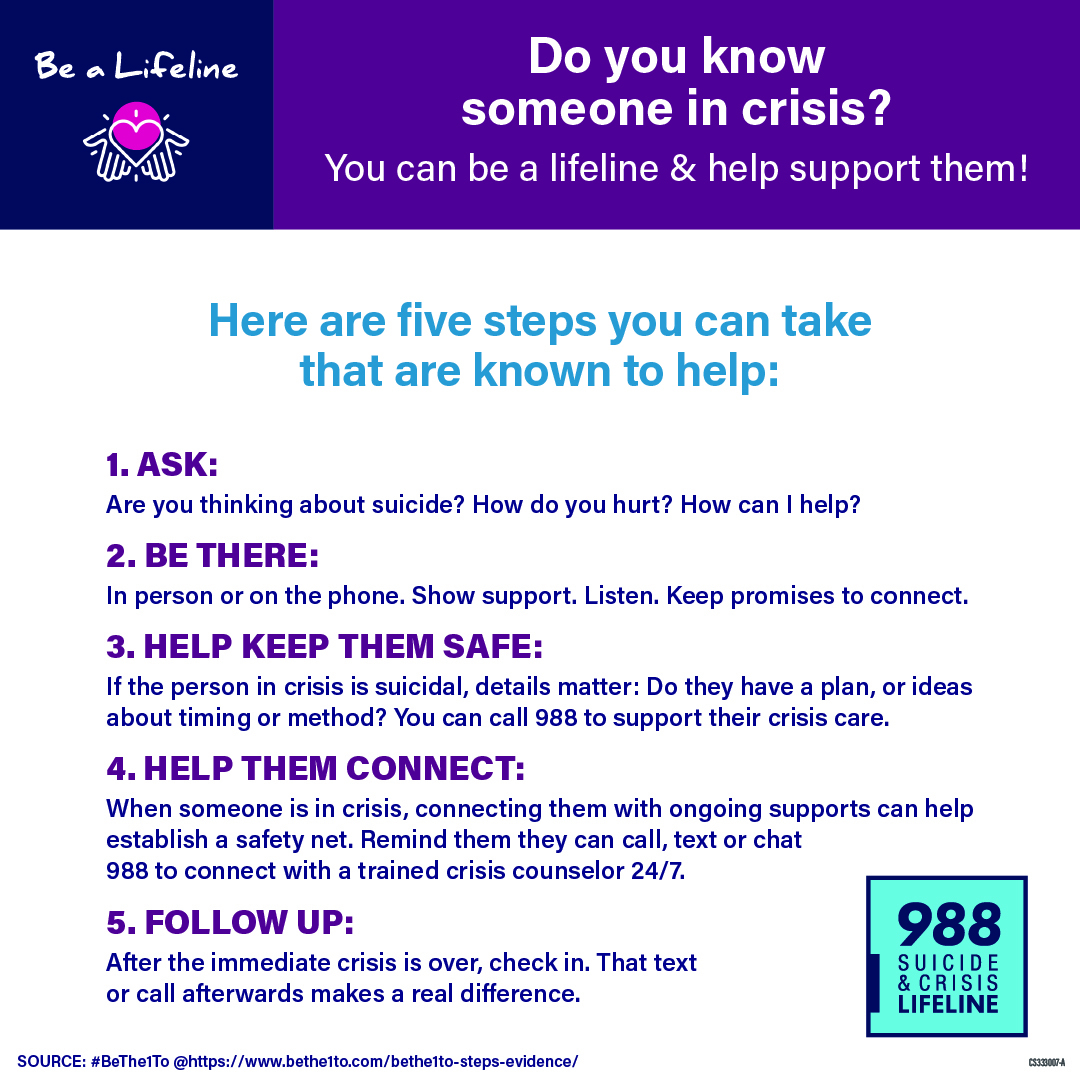May always brings spring flowers and National Children’s Mental Health Awareness Month with events and information to raise awareness about the importance of mental health. If you are visiting our website – you likely already understand that caring for your and your children’s mental health is as important as caring for your physical health. In fact mental health is ESSENTIAL to our overall health and wellness and quality of life.
This year, Awareness Month brought an absolute treasure trove of resources from trusted partners, many of which are shared below. We hope you find some information, tools and tips you can use to support positive mental health in yourself, your kids, friends and loved ones.


Nature and Outdoors Mental Health America Information Sheet**
Mental Health Action Day is a national movement that began in 2021 which encourages people to take their first steps towards mental health action whether for themselves, their loved ones or to advocate for systemic changes in their communities. They and share a variety of resources/ tools for people to seek help, learn how to support a friend, or advocate for change:
Do Something For Your Mental Health Today – 18 Tips
Mental Health America’s 2023 campaign is all about encouraging individuals to look around and look within and consider how the world around them effects their mental health. Their 2023 toolkit provides information about how our environment impacts our mental health, suggestions for making changes to improve and maintain mental well-being, as well as, resources to get help if you need it and tips for deciding if you do.
You Got This Campaign Tip Sheets for Parents & Kids for Talking About Mental Health
Child Mind Institute Mental Health Awareness Month Parent Resources
Child Mind Institute Family Resource Center
More Tips for Teens For Talking About Mental Health – From Mental Health America
Time To Talk: Tips For Talking About Your Mental Health
____________________________________________________________________________
Mental health includes emotional, psychological, and social well-being.
It affects how we think, feel, act and relate to others.
We can support positive mental health in ourselves and kids by taking caring of ourselves
and developing skills and strategies to manage everyday stressors and/or mental health challenges.
Resources we hope can are shared below!

Self Care
Self-care means taking the time to do things that help you live well and improve both your physical health and mental health. When it comes to your mental health, self-care can help you manage stress, lower your risk of illness, and increase your energy. Even small acts of self-care in your daily life can have a big impact. The National Institutes for Mental Health Caring for Your Mental Health page has a wealth of information about self care, when to seek professional help, what to do in a crisis and more.
NIMH Self Care Tips to Help Get You Started
- Get regular exercise. Just 30 minutes of walking every day can help boost your mood and improve your health. Exercise add up, so don’t be discouraged if you can’t do 30 minutes at one time.
- Eat healthy, regular meals and stay hydrated. A balanced diet and plenty of water can improve your energy and focus throughout the day.
- Make sleep a priority. Stick to a schedule, and make sure you’re getting enough sleep. Blue light from devices and screens can make it harder to fall asleep, so reduce blue light exposure from your phone or computer before bedtime.
- Try a relaxing activity. Explore relaxation or wellness programs or apps, which may incorporate meditation, muscle relaxation, or breathing exercises. Schedule regular times for these and other healthy activities you enjoy such as journaling.
- Set goals and priorities. Decide what must get done now and what can wait. Learn to say “no” to new tasks if you start to feel like you’re taking on too much. Try to be mindful of what you have accomplished at the end of the day, not what you have been unable to do.
- Practice gratitude. Remind yourself daily of things you are grateful for. Be specific. Write them down at night, or replay them in your mind.
- Focus on positivity. Identify and challenge your negative and unhelpful thoughts.
- Stay connected. Reach out to your friends or family members who can provide emotional support and practical help.
Self-care looks different for everyone, and it is important to find what you need and enjoy. It may take trial and error to discover what works best for you. For other ideas for healthy practices for your mind, body, surroundings, and relationships, see the National Institutes of Health (NIH) Wellness Toolkits.
For Youth
The MDHHS StayWell Program Teen Page has a variety of great resources to helping teens and young adults maintain mental wellness. Vist today to discover feel-better tips in videos and brochures; find peer support in their Teen Talk group; and learn coping skills by joining a Stay Well workshop.
Mental Health Is Health – Tips to Improve or Protect Your Mental Health
Prioritize being present
Negative feelings can cause a lot of noise in our minds, so it’s important to find ways to be fully-conscious in the moment. Breathing exercises, meditation, going for a walk, journaling, making a gratitude list—they can all help us refocus on what’s going on inside. The important thing is to be consistent, even if things get chaotic, because that’s when we need self-care the most.
Reflect before you react
Nobody is immune to difficult feelings, overwhelming challenges or the occasional bad day—but we can control how we react to them. In moments of stress, anger or other emotions, It’s important to pause and reflect on the factors that may have influenced those feelings, and the best way to cope with the situation.
Talk about tough feelings
Talking about our struggles almost always helps us start feeling better. Speaking up is a sign of strength, and our friends and family members are usually more understanding and supportive than we thought they’d be. You can start by sharing your feelings with someone you trust or reaching out to a counselor or therapist.
Manage Anxiety and Stress – Tips from ADAA
At some point, anxiety and stress affect everyone. It affects different people differently, but there is one thing for certain: there are ways to manage anxiety, even if it feels out of control. Try these when you’re feeling anxious or stressed:
- Take a time-out – Practice yoga, listen to music, meditate, get a massage, or learn relaxation techniques. Stepping back from stress or problems helps clear your head.
- Eat well-balanced meals. Don’t skip any meals. Keep healthy energy-boosting snacks on hand.
- Limit alcohol and caffeine, which can aggravate anxiety and trigger panic attacks.
- Get enough sleep. When stressed, your body needs additional sleep and rest.
- Exercise daily to help you feel good and maintain your health.
- Take deep breaths. Inhale and exhale slowly.
- Count to 10 slowly. Repeat, and count to 20 if necessary.
- Do your best. Instead of aiming for perfection, which isn’t possible, be proud of however close you get.
- Accept that you cannot control everything.
- Try to put your stress in perspective: Is it really as bad as you think?
- Welcome humor. A good laugh goes a long way.
- Make an effort to replace negative thoughts with positive ones.
- Get involved. Volunteer or find another way to be active in your community, which creates a support network and gives you a break from everyday stress.
- Learn what triggers your anxiety. Is it work, family, school, or something else you can identify? Write in a journal when you’re feeling stressed or anxious, and look for a pattern.
- Talk to someone. Tell friends and family you’re feeling overwhelmed, and let them know how they can help you. Talk to a physician or therapist for professional help.
- If anxiety is affecting your everyday life and getting in the way of your daily productivity for an extended period, please seek assistance. Find Help

Other Self Care and Wellness Resources
NIH Emotional Wellness Toolkit
MedlinePlus: How to Improve Mental Health
DBSA Wellness Toolbox (Depression and Bipolar Support Alliance)
Live Your Life Well (Mental Health America)
Mental Health: Keeping Your Emotional Health (American Academy of Family Physicians)
Additional Mental Health Resources
NIMH My Mental Health – Do I Need Help?

Being your authentic self is essential for good mental health. Let’s remind our LGBTQIA+ youth that they are never alone, and that help is available when they need it. If you are feeling distressed or overwhelmed, call, text, or chat 988 for judgment-free support 24/7. #988Lifeline #Together4MH #MHAM2023 #mentalhealthmatters






